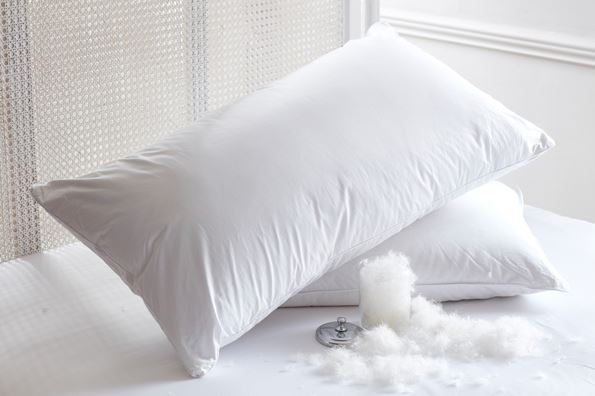Sustainable and Luxurious: The Rise of Ethically Sourced Down Pillows
In today’s world, consumers are increasingly seeking products that marry luxury with sustainability. One such product experiencing a remarkable transformation is the humble down pillow. Once simply a symbol of softness and comfort, down pillows are now at the forefront of a new movement—ethically sourced, sustainable luxury bedding. This article explores how the demand for ethically sourced down pillows has risen, the importance of sustainable practices in the industry, and why these products are reshaping the way we think about comfort and responsibility.

The Appeal of Down Pillows
Down pillows have long been favored for their plush, lightweight feel and their excellent insulating properties. Derived from the fine feathers found beneath the tougher exterior feathers of ducks and geese, down offers unparalleled softness and warmth. Compared to synthetic alternatives, down is more breathable and often lasts longer, which contributes to its reputation as a premium bedding material.
Traditionally, down has been sourced without much regard for animal welfare or environmental impact. The common industry practices often involved live-plucking or force-feeding birds, leading to significant ethical concerns. These methods, combined with the environmental footprint of duck and goose farming, have drawn scrutiny from consumers, activists, and regulatory bodies alike.
Growing Awareness and Consumer Demand
In recent years, awareness about animal welfare and sustainability issues has surged. Consumers, especially millennials and Gen Z, are more informed and conscientious about the products they buy. They want to support brands that align with their values, seeking transparency and ethical assurances.
This shift has created a significant market for ethically sourced down products. Customers are asking critical questions: How was the down harvested? Were the animals treated humanely? What is the environmental impact of producing this pillow?
Brands have responded by innovating and adopting new standards. Certifications like the Responsible Down Standard (RDS) and Global Traceable Down Standard (Global TDS) have emerged to ensure that down is sourced responsibly. These standards prohibit live-plucking and force-feeding and require farms to meet strict animal welfare criteria.
What Does Ethical Sourcing Mean?
Ethical sourcing of down involves ensuring that the feathers are obtained in a way that minimizes harm and distress to the animals. This typically means:
-
No live-plucking: Feathers are collected only during natural molting seasons or after birds have been humanely slaughtered for food.
-
Humane treatment: Ducks and geese are raised in environments that allow natural behaviors, with appropriate space, food, and care.
-
Traceability: Every step of the supply chain can be tracked to verify compliance with welfare standards.
-
Sustainability: Farming practices that reduce environmental impact, including water use, carbon emissions, and habitat preservation.
By adopting these measures, brands can produce down pillows that consumers feel good about using, combining luxury with a commitment to ethics.
The Environmental Impact of Down Production
Sustainability is not just about animal welfare; it also encompasses environmental responsibility. Traditional down sourcing often involves large-scale poultry farming, which can contribute to pollution, greenhouse gas emissions, and resource depletion.
Ethically sourced down comes from farms that implement sustainable agricultural practices, such as:
-
Reducing waste and recycling water
-
Minimizing the use of harmful chemicals and antibiotics
-
Managing land responsibly to prevent erosion and biodiversity loss
-
Using renewable energy sources wherever possible
These practices help lower the carbon footprint of down production and make the product more sustainable from farm to finished pillow.
Luxurious Comfort Meets Responsibility
One of the greatest challenges for brands producing ethically sourced down pillows has been maintaining the luxurious quality that consumers expect. Fortunately, advancements in farming, processing, and product design mean that sustainability and luxury can coexist.
Ethically sourced down is often cleaner, fluffier, and more resilient due to improved farming conditions. When combined with high-quality craftsmanship—such as fine cotton or silk pillow covers and hypoallergenic treatments—the result is a pillow that offers both exceptional comfort and peace of mind.
Consumers are discovering that these pillows not only feel better but last longer, making them a smart investment for health, comfort, and the environment.
The Role of Certifications
Certifications play a crucial role in building consumer trust. Some of the most important certifications in ethically sourced down pillows include:
-
Responsible Down Standard (RDS): Ensures that down and feathers come from animals that have not been subjected to unnecessary harm.
-
Global Traceable Down Standard (Global TDS): Provides traceability of down across the supply chain and verifies humane treatment.
-
OEKO-TEX Standard 100: Certifies that textiles used in the pillow are free from harmful substances.
These certifications provide transparency, allowing consumers to verify that their purchase meets strict ethical and environmental criteria.
Market Trends and Brand Innovations
The rise of ethically sourced down pillows is part of a broader trend in sustainable luxury goods. Leading brands in the bedding industry have started to:
-
Source down from farms certified under RDS or Global TDS.
-
Develop innovative cleaning and processing methods that reduce water and chemical use.
-
Use organic or recycled fabrics for pillow covers.
-
Incorporate biodegradable or recyclable packaging.
-
Educate consumers about the benefits of ethical sourcing.
Some brands even offer traceability apps or QR codes, enabling buyers to learn about the origin of their pillow in real time.
Challenges and Future Outlook
While the rise of ethically sourced down pillows is promising, challenges remain:
-
Cost: Ethically sourced down is generally more expensive to produce, leading to higher retail prices.
-
Supply chain complexity: Ensuring traceability and compliance across international suppliers can be difficult.
-
Consumer education: Not all consumers are aware of the differences between ethical and conventional down.
However, as demand continues to grow and economies of scale improve, prices are likely to become more accessible. Increased consumer education and advocacy will further drive market transformation.
Looking ahead, innovations such as lab-grown down alternatives and advanced recycling technologies could further enhance sustainability in the industry.
Why Choose Ethically Sourced Down Pillows?
For consumers, choosing ethically sourced down pillows is a way to support better animal welfare, reduce environmental impact, and enjoy premium comfort. These pillows represent a conscious choice to prioritize quality and ethics over convenience or cost alone.
By investing in ethically sourced down pillows, buyers contribute to a positive shift in the bedding industry—one where luxury and responsibility go hand in hand. This trend reflects a broader societal movement towards mindful consumption and respect for the planet.
Conclusion
The rise of ethically sourced down pillows signals an exciting evolution in home comfort products. As consumers demand more transparency and sustainability, brands are responding with innovations that honor animal welfare, reduce environmental harm, and deliver unmatched luxury.
Choosing a down pillow today means more than just picking softness—it means choosing a product with a story of care, responsibility, and craftsmanship behind it. Sustainable and luxurious, ethically sourced down pillows are shaping a new future for comfort-conscious consumers worldwide.





